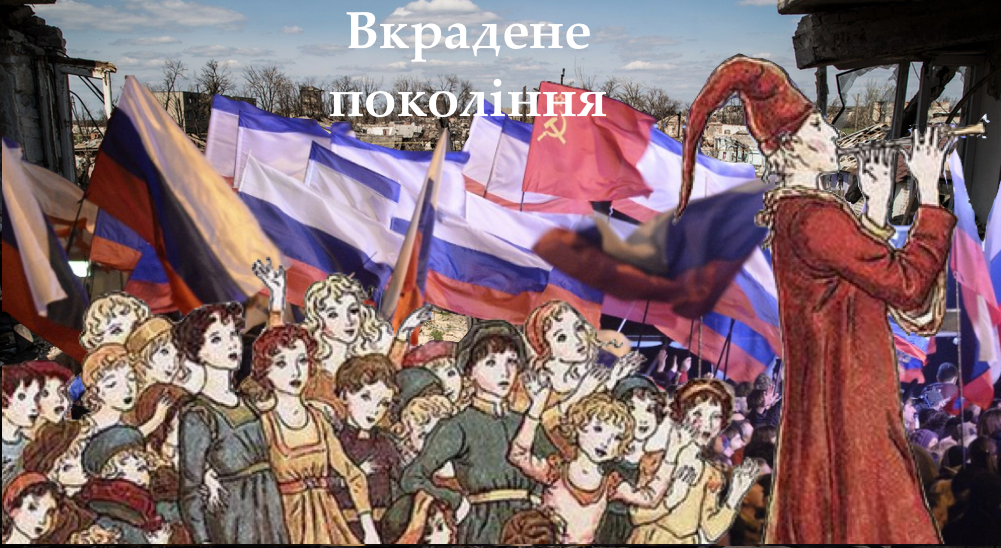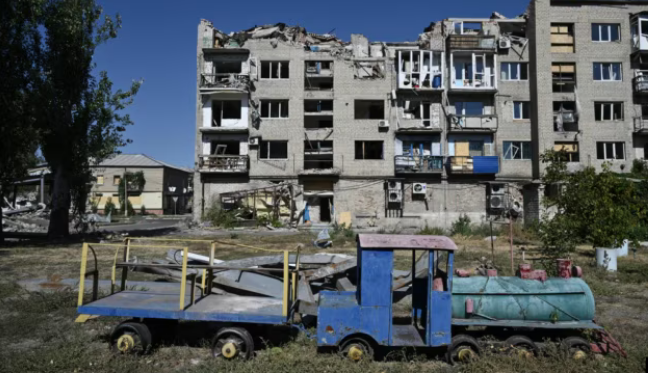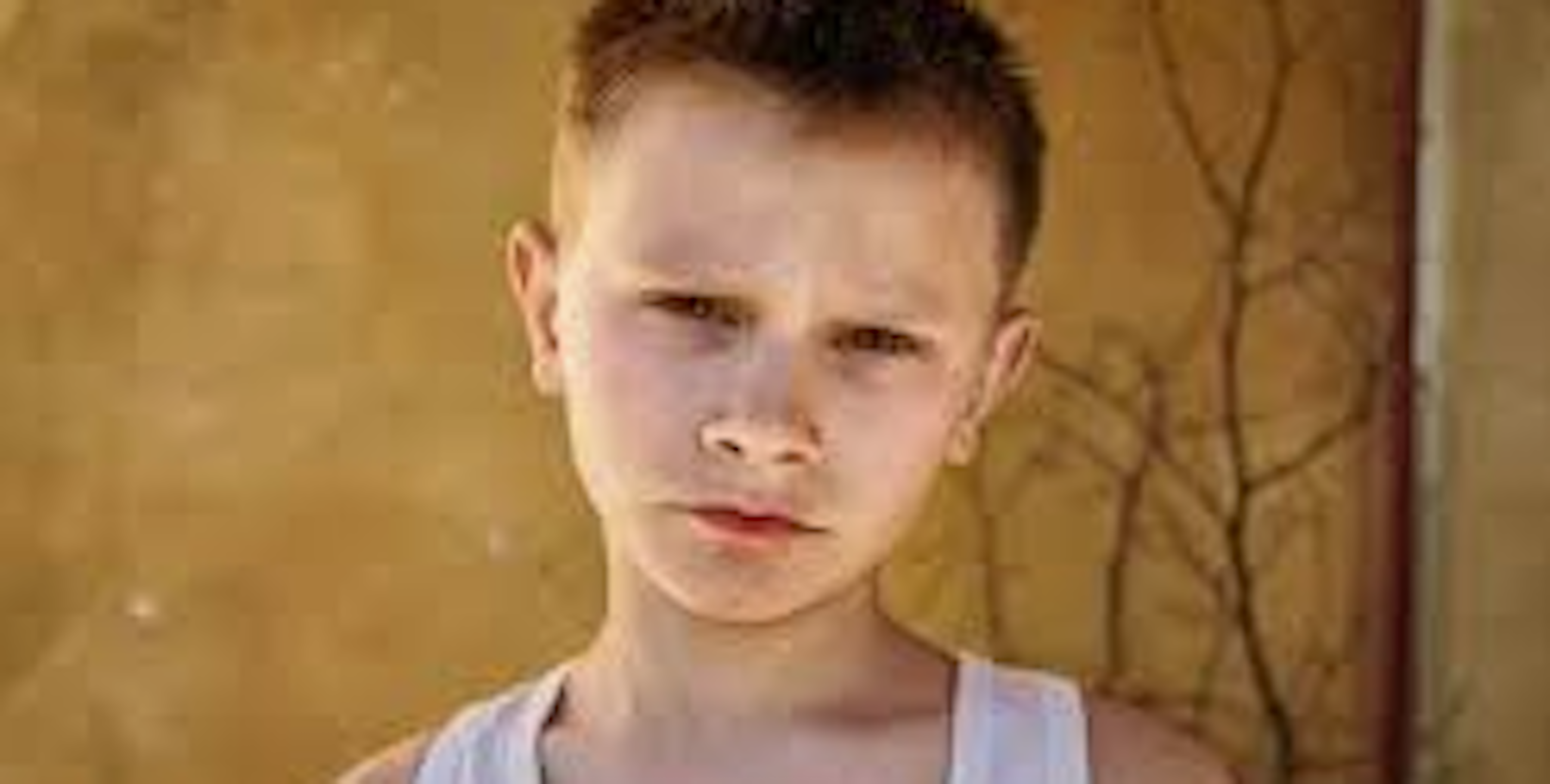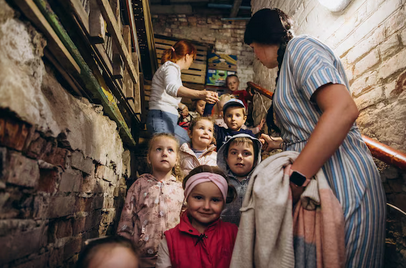The snide Piper of Kremlin: Ukraines stolen generation

Where have all the children gone?
When a family loses a child, it is a heartbreak beyond words. It's a wound that never truly heals. When a child is stolen, ripped from their parents’ arms, it is an unimaginable cruelty. When a child loses their parents in an unspeakably violent fashion, they are subject to levels of trauma and psychological damage few can comprehend. Now, multiply that by tens of thousands. Ukrainian children, taken from their homes, torn from everything they know, and sent to a foreign land where they face an uncertain fate: this is not just a tragedy, it is a calculated act of erasure. Many may never see their families again, raised instead to forget who they are, made to dismiss their own language and culture to be turned against their own people. It is the stuff of nightmares, a crime that echoes the darkest chapters of human history.
Since the beginning of the war in 2022, the Russian government has been a forcibly deporting Ukrainian children to Russia, in parallel with a broader illegal resettlement program aimed at undermining Ukraine’s national identity and integrating the children into Russian society. Reports indicate that the children, many of whom have been orphaned by the war in the lands taken by the Russians or have been separated from their families during the conflict. They have been taken to camps in Russia or Russian-controlled territories. These children are subjected to forced assimilation, including being given Russian citizenship, and are often placed with Russian families in a process referred to as 'adoption.' If this sounds familiar, it is. When the Nazis invaded Poland in 1939, they separated out the blond haired blue eyed children from the rest and sent them to live with German families where they were forbidden from speaking polish and were indoctrinated into fascism. Russian authorities claim that the program is aimed at protecting the children and providing them with better living conditions, but this is widely seen as a cover for the illegal and immoral act of kidnapping.
Parallels can also be drawn with the horrors of Gaza. Just like the children who have been killed in the war there or sit in Israeli prisons, these children are innocent victims of a war they had no part in starting and were not invested in. Many will not understand what is happening to them and why.

Ukrainian authorities estimate that approximately 20,000 children have been forcibly relocated, with some sources suggesting the actual number could be significantly higher. Euromaidan PressУкраїнська правда
To grasp the enormity of this tragedy think of a city like Northampton, Reading, Peterborough, Southampton or Sheffield. Now imagine any of those cities where overnight every child under 16 disappeared, with no way of knowing whether they would be returning. Office for National Statistics
The Ukrainian government has identified over 4,500 of these children as orphans or those deprived of parental care. Disturbingly, Russia's Children's Rights Commissioner, Maria Lvova-Belova, reported that since February 2022, Russia has 'received' more than 700,000 Ukrainian children, though it's claimed that the majority arrived with their families as part of the 4.8 million displaced Ukrainian families taken into Russian custody. Euromaidan Presshrwf.eu+3The Moscow Times+3Українська правда+3 Reuters+5Euromaidan Press+5The Moscow Times+5
The UN and the Ukriane Conflict Observatory have been keeping track on the movements of these children. The forced deportation and assimilation of Ukrainian children by Russian authorities has been documented across various regions within Russia and Russian-occupied territories. Key locations identified include:
- Far Eastern Regions and Siberia: Russian authorities have relocated Ukrainian children to remote areas such as Siberia and the Far East. These regions are often isolated and underdeveloped, making it challenging for international observers to monitor the situation. According to reports, nearly 2.5 million Ukrainians, including approximately 38,000 children, have been transferred from southern and eastern Ukraine to these distant regions. UN Press
- Russian-Occupied Crimea: Since its annexation in 2014, Crimea has served as a significant site for the relocation of Ukrainian children. Facilities in Crimea have been used to "re-educate" Ukrainian children, aiming to integrate them into Russian society. Reports indicate that at least 41 facilities, including summer camps, are located in Russian-occupied Crimea and Russia, with 12 camps clustered around the Black Sea and 7 in Crimea. Sceeus
- Major Russian Cities: Children have also been moved to major urban centers such as Moscow, Kazan, and Yekaterinburg. These cities host facilities where Ukrainian children are subjected to assimilation programs, including language training and cultural indoctrination. The relocation network includes 43 facilities in Russia and Russian-occupied territories, with camps located around Moscow, Kazan, and Yekaterinburg. Sceeus
- "Re-education Camps" Across Russia: A network of at least 43 facilities, including 13 in Belarus and 30 in Russia and Russian-occupied territories, has been identified. These camps are spread widely, from Russia-occupied Crimea in Ukraine to Russia's Far East. The majority engage in pro-Russia re-education initiatives, while others provide military training, aiming to assimilate Ukrainian children into Russian culture and society, and the military, where they may be sent off to fight Ukrianians. Wikipedia+2Yale School of Medicine+2Yale Daily News+2U.S. Embassy GeorgiaYale Daily News
This forced deportation of children is considered a war crime under international law, as it involves the unlawful transfer of civilians during an armed conflict, which is strictly prohibited. The International Criminal Court (ICC) has issued arrest warrants for both Russian President Vladimir Putin and his Commissioner for Children’s Rights, Maria Lvova-Belova, accusing them of orchestrating this illegal resettlement. Ukraine has called the forced deportation of children part of a broader attempt to erase Ukrainian culture and identity, and these children face not only physical displacement but also the risk of psychological trauma and separation from their true families. Universitetet i Bergen
In the United States, The Ukraine Conflict Observatory, (UCO) led by Yale University, was focused on documenting and tracking human rights abuses and war crimes committed during the ongoing conflict in Ukraine, including the abduction and deportation of Ukrainian children by Russian forces. The observatory’s primary task was to gather evidence and provide accurate reports on the forced relocation of children, a practice that constitutes a violation of international law. By using satellite imagery, interviews, and data analysis, the observatory was instrumental in identifying patterns of forced deportations, creating a database of missing children, and assisting efforts to hold Russia accountable for these actions. Their work has been vital in bringing global attention to these war crimes. In his newly gound pro Russian fascist zeal, Trump has this week suspended funding for this but at the time of writing this has since put a temporary stay of execution on it. https://www.nytimes.com/2025/03/18/us/politics/trump-ukraine-abducted-children.html This decision to pull funding has drawn sharp criticism from various quarters, including Democratic lawmakers and international observers, who argue that halting such funding undermines efforts to document and seek accountability for these war crimes. It also closes down any chance of returning these children when the war ends. The Guardian+2Reuters+2Reuters+2Reuters
And what about the children? The children forcibly deported by Russia are likely to face a range of traumatic experiences and long-term psychological effects, which can vary in severity depending on their individual circumstances, including the nature of their displacement and their separation from family.

- Separation from Families: Many of these children have been separated from their parents and relatives during the conflict. Separation from family is one of the most significant stressors, especially for children, leading to feelings of abandonment, insecurity, and deep emotional pain. Studies show that children who experience parental separation are more likely to suffer from anxiety, depression, and attachment disorders (UNICEF).
- Loss of Cultural Identity: Forced assimilation into Russian society, where children are pressured to adopt Russian language, customs, and values, can lead to a loss of their Ukrainian cultural identity. This disconnection from their heritage can cause feelings of alienation, confusion, and identity crises, as children struggle to reconcile their past with their new environment. This phenomenon is supported by research into the impact of forced assimilation on minority children (Psychology Today).
- Psychological Trauma of Forced Displacement: Forced migration, particularly in the context of war, often leads to severe trauma, including post-traumatic stress disorder (PTSD). These children are likely to have witnessed violence, the destruction of their homes, or the loss of loved ones. Studies show that children exposed to conflict experience a heightened risk of PTSD, depression, and emotional dysregulation (World Health Organization).
- Risk of Exploitation and Abuse: In some cases, these children may be vulnerable to exploitation or abuse in their new environments. The psychological effects of living in orphanages, institutions, or under the care of strangers can be devastating, especially if they face neglect or mistreatment. The United Nations has raised concerns about the abuse children face in war zones, with displacement often exacerbating their vulnerability (United Nations High Commissioner for Refugees).
- Loss of Stability and Education: Being uprooted from their homes and placed in new environments can disrupt the children's education, further isolating them from their peers and the routines that normally provide a sense of safety. The lack of proper educational and psychological support can significantly hinder their development and well-being (UNICEF).
The trauma experienced by these children is not just physical but deeply emotional and psychological, likely to have lasting effects on their mental health and sense of self. Rebuilding their lives will require intensive psychological support and the restoration of their familial and cultural ties.

Following Russia's invasion of Ukraine in 2022, the UK government took a series of measures aimed at seizing Russian assets and imposing sanctions on individuals and entities with close ties to the Kremlin. These actions are part of the UK's broader strategy to pressure Russia economically and politically, aiming to limit its ability to finance its military actions and punish those who support Putin’s regime. This week, in response to the funding cuts for the UCO, the UK Liberal Democrats have called on the UK government to step in and finance the program. They propose utilising £2 billion from the sale of Roman Abramovich's Chelsea FC to support efforts to trace and repatriate the abducted Ukrainian children. The Guardian
The forced deportation and resettlement of Ukrainian children by Russia remains contentious and deeply troubling, highlighting the need for continued international attention and intervention to protect vulnerable children and uphold international law.
Nobody knows what will happen to these children, how deep the scars of their abduction will run, the depth of the trauma they will carry or whether they will ever see their families again. Their childhoods have been ripped away, their futures have been stolen along with their childhoods: their identities at risk of being rewritten by those who took them. In a war already defined by brutality, this is a monsterous low, reinforced by the US failing these children in their hour of need. This is an atrocity that will not only scar these poor children, but, drawing equivalence with the horrors of the Holodomor, Stalins starvation pogrom against the Ukrainians in the 1920's, equally this will clearly haunt an entire nation for generations to come.

